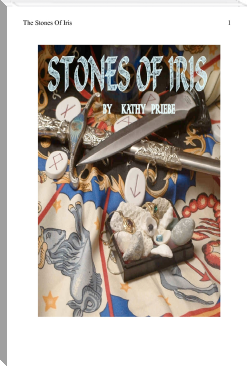Myths And Legends Of Our Own Land (The Isle of Manhattoes and Nearby) - Charles M. Skinner (funny books to read txt) 📗

- Author: Charles M. Skinner
Book online «Myths And Legends Of Our Own Land (The Isle of Manhattoes and Nearby) - Charles M. Skinner (funny books to read txt) 📗». Author Charles M. Skinner
Dolph Heyliger The Knell at the Wedding Roistering Dirck Van Dara The Party from Gibbet Island Miss Britton's Poker The Devil's Stepping-Stones The Springs of Blood and Water The Crumbling Silver The Cortelyou Elopement Van Wempel's Goose The Weary Watcher The Rival Fiddlers Wyandank Mark of the Spirit Hand The First Liberal Church
THE ISLE OF MANHATTOES AND NEARBY DOLPH HEYLIGERNew York was New Amsterdam when Dolph Heyliger got himself born there, --a graceless scamp, though a brave, good-natured one, and being left penniless on his father's death he was fain to take service with a doctor, while his mother kept a shop. This doctor had bought a farm on the island of Manhattoes--away out of town, where Twenty-third Street now runs, most likely--and, because of rumors that its tenants had noised about it, he seemed likely to enjoy the responsibilities of landholding and none of its profits. It suited Dolph's adventurous disposition that he should be deputed to investigate the reason for these rumors, and for three nights he kept his abode in the desolate old manor, emerging after daybreak in a lax and pallid condition, but keeping his own counsel, to the aggravation of the populace, whose ears were burning for his news.
Not until long after did he tell of the solemn tread that woke him in the small hours, of his door softly opening, though he had bolted and locked it, of a portly Fleming, with curly gray hair, reservoir boots, slouched hat, trunk and doublet, who entered and sat in the arm-chair, watching him until the cock crew. Nor did he tell how on the third night he summoned courage, hugging a Bible and a catechism to his breast for confidence, to ask the meaning of the visit, and how the Fleming arose, and drawing Dolph after him with his eyes, led him downstairs, went through the front door without unbolting it, leaving that task for the trembling yet eager youth, and how, after he had proceeded to a disused well at the bottom of the garden, he vanished from sight.
Dolph brooded long upon these things and dreamed of them in bed. He alleged that it was in obedience to his dreams that he boarded a schooner bound up the Hudson, without the formality of adieu to his employer, and after being spilled ashore in a gale at the foot of Storm King, he fell into the company of Anthony Vander Hevden, a famous landholder and hunter, who achieved a fancy for Dolph as a lad who could shoot, fish, row, and swim, and took him home with him to Albany. The Heer had commodious quarters, good liquor, and a pretty daughter, and Dolph felt himself in paradise until led to the room he was to occupy, for one of the first things that he set eyes on in that apartment was a portrait of the very person who had kept him awake for the worse part of three nights at the bowerie in Manhattoes. He demanded to know whose picture it was, and learned that it was that of Killian Vander Spiegel, burgomaster and curmudgeon, who buried his money when the English seized New Amsterdam and fretted himself to death lest it should be discovered. He remembered that his mother had spoken of this Spiegel and that her father was the miser's rightful heir, and it now appeared that he was one of Heyden's forbears too. In his dream that night the Fleming stepped out of the portrait, led him, as he had done before, to the well, where he smiled and vanished. Dolph reflected, next morning, that these things had been ordered to bring together the two branches of the family and disclose the whereabouts of the treasure that it should inherit. So full was he of this idea that he went back to New Amsterdam by the first schooner, to the surprise of the Heer and the regret of his daughter.
After the truant had been received with execrations by the doctor and with delight by his mother, who believed that spooks had run off with him, and with astonishment, as a hero of romance, by the public, he made for the haunted premises at the first opportunity and began to angle at the disused well. Presently he found his hook entangled in something at the bottom, and on lifting slowly he discovered that he had secured a fine silver porringer, with lid held down by twisted wire. It was the work of a moment to wrench off the lid, when he found the vessel to be filled with golden pieces. His fishing that day was attended with such luck as never fell to an angler before, for there were other pieces of plate down there, all engraved with the Spiegel arms and all containing treasure.
By encouraging the most dreadful stories about the spot, in order to keep the people wide away from it, he accomplished the removal of his prizes bit by bit from their place of concealment to his home. His unaccounted absence in Albany and his dealings with the dead had prepared his neighbors for any change in himself or his condition, and now that he always had a bottle of schnapps for the men and a pot of tea for the women, and was good to his mother, they said that they had always known that when he changed it would be for the better,--at which his old detractors lifted their eyebrows significantly--and when asked to dinner by him they always accepted.
Moreover, they made merry when the day came round for his wedding with the little maid of Albany. They likewise elected him a member of the corporation, to which he bequeathed some of the Spiegel plate and often helped the other city fathers to empty the big punch-bowl. Indeed, it was at one of these corporation feasts that he died of apoplexy. He was buried with honors in the yard of the Dutch church in Garden Street.
THE KNELL AT THE WEDDING
A young New Yorker had laid such siege to the heart of a certain belle-- this was back in the Knickerbocker days when people married for love-- that everybody said the banns were as good as published; but everybody did not know, for one fine morning my lady went to church with another gentleman--not her father, though old enough to be--and when the two came out they were man and wife. The elderly man was rich. After the first paroxysm of rage and disappointment had passed, the lover withdrew from the world and devoted himself to study; nor when he learned that she had become a widow, with comfortable belongings derived from the estate of the late lamented, did he renew acquaintance with her, and he smiled bitterly when he heard of her second marriage to a young adventurer who led her a wretched life, but atoned for his sins, in a measure, by dying soon enough afterward to leave a part of her fortune unspent.
In the lapse of time the doubly widowed returned to New York, where she met again the lover of her youth. Mr. Ellenwood had acquired the reserve of a scholar, and had often puzzled his friends with his eccentricities; but after a few meetings with the object of his young affection he came out of his glooms, and with respectful formality laid again at her feet the heart she had trampled on forty years before. Though both of them were well on in life, the news of their engagement made little of a sensation. The widow was still fair; the wooer was quiet, refined, and courtly, and the union of their fortunes would assure a competence for the years that might be left to them. The church of St. Paul, on Broadway, was appointed for the wedding, and it was a whim of the groom that his bride should meet him there. At the appointed hour a company of the curious had assembled in the edifice; a rattle of wheels was heard, and a bevy of bridesmaids and friends in hoop, patch, velvet, silk, powder, swords, and buckles walked down the aisle; but just as the bride had come within the door, out of the sunlight that streamed so brilliantly on the mounded turf and tombstones in the churchyard, the bell in the steeple gave a single boom.
The bride walked to the altar, and as she took her place before it another clang resounded from the belfry. The bridegroom was not there. Again and again the brazen throat and iron tongue sent out a doleful knell, and faces grew pale and anxious, for the meaning of it could not be guessed. With eyes fixed on the marble tomb of her first husband, the woman tremblingly awaited the solution of the mystery, until the door was darkened by something that made her catch her breath-- a funeral. The organ began a solemn dirge as a black-cloaked cortege came through the aisle, and it was with amazement that the bride discovered it to be formed of her oldest friends,--bent, withered; paired, man and woman, as in mockery--while behind, with white face, gleaming eyes, disordered hair, and halting step, came the bridegroom, in his shroud.
"Come," he said,--let us be married. The coffins are ready. Then, home to the tomb."
"Cruel!" murmured the woman.
"Now, Heaven judge which of us has been cruel. Forty years ago you took away my faith, destroyed my hopes, and gave to others your youth and beauty. Our lives have nearly run their course, so I am come to wed you as with funeral rites." Then, in a softer manner, he took her hand, and said, "All is forgiven. If we cannot live together we will at least be wedded in death. Time is almost at its end. We will marry for eternity. Come." And tenderly embracing her, he led her forward. Hard as was the ordeal, confusing, frightening, humiliating, the bride came through it a better woman.
"It is true," she said, "I have been vain and worldly, but now, in my age, the truest love I ever knew has come back to me. It is a holy love. I will cherish it forever." Their eyes met, and they saw each other through tears. Solemnly the clergyman read the marriage service, and when it





Comments (0)